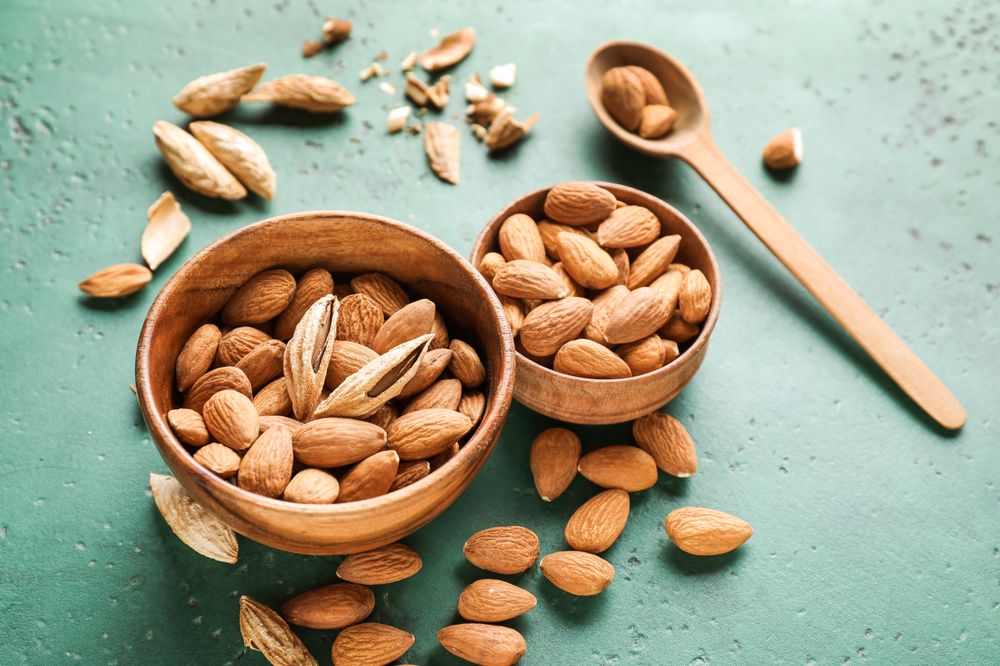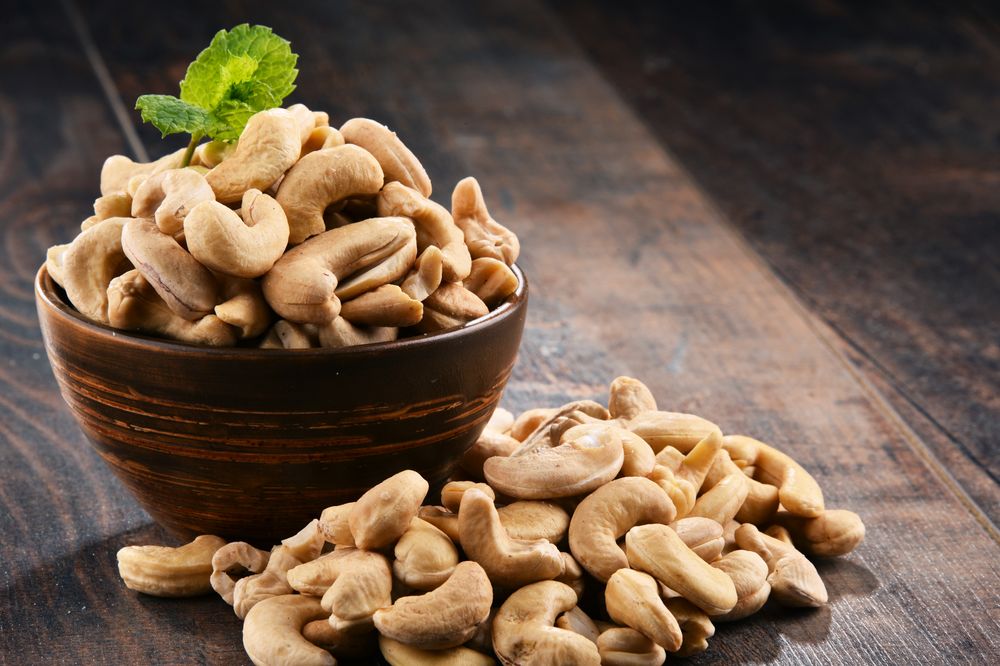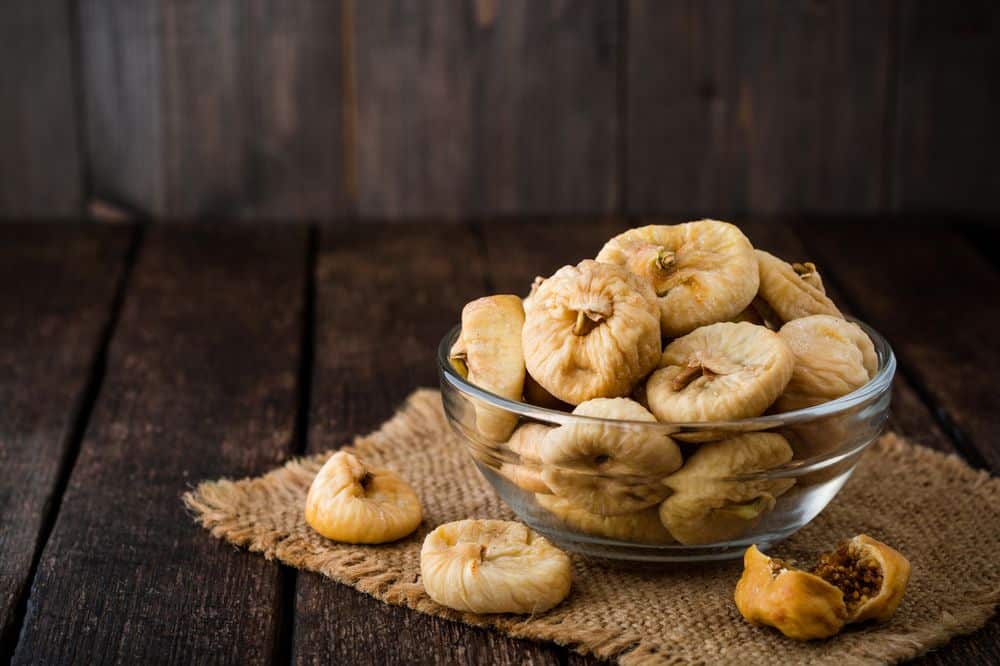Dry Fruits And Their 9 Amazing Health Benefits
1. Immunity Boosters
Dry fruits are rich in potassium, magnesium, calcium, zinc, phosphorus and various vitamins like vitamin A, D, B6, K1 and E. These nutrients are essential for a healthy immune system. According to a study, dry fruits with high levels of polyphenols help improve immunity by showing anti-inflammatory effects. It is due to the antioxidant properties of several dry fruits. It also helps eliminate free radicals and relieve oxidative stress.
2. Weight Loss Properties
Dry fruits are rich in carbohydrates and dietary fibre. As a result, they are one of the best snacking options. The dietary fibre keeps you satiated for long and controls the urge to eat between meals. As a result, your calorie consumption reduces . At the same time, dietary fiber is good for a healthy gut and improves bowel movements.
Limited calorie intake and a healthy gut are two fundamentals of weight loss. Thus, dry fruits rich in dietary fibre help lose weight. As per studies, the fat content in some nuts takes time to absorb in your body. Hence, it prevents weight gain.
3. Dry Fruits for Gut Health
Gut health improvement is another benefit of the dietary fibres in dry fruits. Dry fruits are rich in dietary fibre, both soluble and insoluble.these dietary fiber help in adding bulk to stool. As a result, dry fruits help maintain a healthy bowel movement. A recent study suggests that dry fruits like prunes contain bifidobacteria, which help improve digestive health.
4. Skincare Benefits
Free radicals are unstable molecules that tend to latch onto the oxygen inside the body. Due to this, the healthy cells are oxygen deprived, leading to oxidative stress. As per studies, oxidative stress can lead to several skin diseases and chronic inflammation.
Therefore, an antioxidant-rich diet can help you achieve and maintain healthy skin.
5. Heart Health
Many dry fruits like walnuts are rich in omega-3 fatty acids. Omega-3 helps reduce the triglyceride levels in the blood, which helps control cholesterol. As a result, it aids in preventing the arteries from clogging and, thus, decreases the chances of heart attacks. Omega-3 also helps prevent plaque build-up in the arteries.
A recent study proves that eating specific types of nuts like almonds, walnuts and pistachios may help reduce the chances of cardiovascular disease and coronary heart disease. The study supports the recommendations of increasing the intake of various nuts as part of healthy dietary patterns.
6. Bone Health
Dry fruits are rich in healthy nutrients like magnesium, boron, vitamin K and calcium. These nutrients influence our bone health. For example, our skeletal structure is full of calcium, and several dry fruits like dried apricots, figs etc., help give adequate amounts of calcium. As a result, they help prevent bone-related issues and strengthen our bones.
Having calcium deficiency in the body can lead to diseases like osteoporosis. In this condition, the bones become fragile, which increases the chances of unexpected fractures. Therefore, having healthy servings of dry fruits can help decrease the chances of osteoporosis. Studies suggest that low boron intake may lead to bone impairment issues.
7. Beneficial for Type-2 Diabetes
A 2017 study demonstrates a positive correlation between dry fruits and type-2 diabetes. Nuts and dried fruits can efficiently counteract metabolic diseases such as type 2 diabetes. Their unique macronutrients, micronutrients and other bioactive compounds are responsible for a positive effect on diabetes.
Dry fruits contain fibre, fat, minerals and other bioactive molecules. These molecules help modulate several gene mechanisms at the cellular and molecular levels. Some studies suggest that the dietary fibre in many dry fruits like cashews help to lower blood sugar spikes by controlling insulin levels.
8. Cancer Prevention
Several studies prove the effect of dry fruits in cancer prevention. For example, dry fruits like almonds are rich in phytonutrients because of vitamin A content. These nutrients show properties to help prevent certain kinds of cancer. The findings of a study establish an inverse relationship between dry fruits consumption and cancer.
As per the study, Increasing the intake of dried fruits like raisins, figs, prunes (dried plums) and dates to 3-5 or more servings per week may help reduce the risk of prostate, pancreatic, colon, stomach and bladder cancers.
9. Blood Pressure Management
Low magnesium levels in our bodies may result in high blood pressure. It can lead to many other disorders such as stroke, kidney failure and even heart attacks. One of the most popular dry fruits, almonds are naturally rich in magnesium and carry almost 76.5mg of magnesium per 28g of servings. So, including almonds in your diet can prove to be very beneficial.
A study shows that adding magnesium to dietary supplements can help lower blood pressure in diabetic hypertensive adults. Magnesium acts as a natural vasodilator and prevents the blood vessels from constricting. As a result, it helps maintain healthy blood pressure.
Types of Dry Fruits and Their Benefits
1. Almond
Almonds are the seeds of the prune trees. They are low-carb nuts that you can find in salted, unsalted, raw or roasted form. Raw almonds are sodium-free and are better for people with high blood pressure. However, almonds are calorie-rich foods and can be harmful to people with type 2 diabetes. Therefore, you should eat them in moderation.
Almonds are also beneficial for a sharp memory. Also, the antioxidants and omega-3 present in almonds help delay the cell ageing process in the brain cells.
The best way to include almonds in your diet can be an oatmeal topping, almond milkshake, or just consuming them raw for breakfast.
Nutrition Value of Almond
100 grams of unsalted almonds contain:
- Calories: 744 kCal
- Fat: 59.9 g
- Carbohydrates: 26.9 g
- Fibre: 15 g
- Protein: 25.4 g
2. Pistachios
Pistachios grow on trees and belong to the cashew family. The nuts may be yellow or green, and the hard shell enclosure covering the pistachio helps protect the nut/seed.
Pistachios are rich in micro and macronutrients, such as potassium, magnesium and vitamin B6. Vitamin B6 is an essential nutrient for the body as it helps to make haemoglobin in the blood. Haemoglobin is required to transport oxygen to various cells inside the body. Moreover, pistachios are also rich in vitamin A, a type of carotenoid. Carotenoids are essential to improve eyesight.
The best way to consume pistachios is to eat them raw as a delicious snack. They are also very popularly used in flavoured milk and milkshakes.
Nutrition Value of Pistachios
100 grams of pistachios contain:
- Calories: 626 kCal
- Carbohydrates: 16.2 g
- Protein: 19.8ng
- Fibre: 10.3 g
- Fats: 53.5 g
3. Dates
Dates are the fruits of the palm tree and have a single seed. However, you can find the seedless variant of dates in the market. They are a prevalent dry fruit, and people commonly eat them during winters. In addition, they are naturally dehydrated and low in moisture content. Although dates are high in calories and sugar, they have several health benefits.
Dried dates are rich in dietary fibre, which helps keep you satiated and suppress your cravings. It is rich in iron which helps prevent issues like anaemia. Dates may help reduce weight, increase haemoglobin, improve gut health and provide energy.
Dates are naturally rich in antioxidants and polyphenols. The antioxidants help reverse and prevent oxidative damage caused by free radicals inside the body.
Dates make excellent snacking options because they are pretty filling. One way to include dates in your diet can be by having them for breakfast with milk. It makes a very nutritious meal.
Nutrition Value of Dates
100 grams of Dates contains:
- Calories: 317 kCal
- Carbohydrates: 75.8 g
- Protein: 2.5 g
- Fibre: 8.3 g
- Fats: 0.4 g
4. Cashew
Cashew nuts are the seeds of the cashew tree. They are rich in minerals, fibre, and plant protein. Cashew also contain high amounts of healthy monounsaturated fats. They are also rich in antioxidants and polyphenols. Polyphenols help to reduce inflammation which can help in boosting immunity. Cashews provide high amounts of vitamin E, vitamin B6, proteins, and magnesium. As a result, they help reduce bad cholesterol and the risk of heart diseases. Cashews also help lose weight.
One incredible health benefit of cashews is their scientifically proven effects on type 2 diabetes. Cashew nuts can help lower blood sugar levels and help maintain blood insulin levels. As a result, they benefit type-2 diabetes patients.
You can consume raw cashews for breakfast or as evening snacks. You can also include them in your diet by adding them into milkshakes.
Nutrition Value of Cashews
One serving of 100 g of cashews contain:
- Calories: 596 Kcal
- Carbohydrates: 22.3 g
- Protein: 21.2 g
- Fibre: 3.3 g
- Fats: 46.9 g
5. Walnut
Walnuts are the nuts of the tree Juglans family. These nuts are enclosed in a tough outer case that you must remove to get to the nut.
Walnuts are also an excellent source of plant-based Omega-3s, an essential nutrient. The omega-3 content makes them very beneficial for brain health. They have a unique texture and shape that resembles the human brain. The brain sharpening properties of omega-3 and the unique shape of walnuts make them popular as brain food. DHA, a form of omega-3 fatty acids, protects newborns’ brain health, improves cognitive performance in adults, and prevents or lessens age-related cognitive decline.
The vitamins, minerals, proteins, and antioxidants in walnuts help reduce stress, prevent cancer, and benefit the hair and skin. The, carbohydrates and proteins contribute to the total calorie value of walnuts, which makes them quite filling. You can include walnuts in your breakfast as raw nuts or add them to your oatmeal or yoghurt.
Nutrition Value of Walnuts
One ounce or 100 grams of walnuts contain:
- Calories: 687 kCal
- Carbohydrates: 11 g
- Protein: 15.6 g
- Fibre: 6.7 g
- Fats: 64.5 g
6. Hazelnut
Hazelnuts are tree nuts that have a crunchy, sweet and nutty flavour. They have a hard seed coat covering, which you must remove to access the nut. Hazelnuts are a nutritionally-rich choice for nuts.
Hazelnuts help increase the low-density lipoprotein levels, which can help to lower blood cholesterol levels. They are also a good source of iron, which our blood requires for a healthy oxygen supply in the body.
You can add hazelnuts to your milkshakes or in pies, truffles etc.
Nutrition Value of Hazelnuts
One ounce or 100 grams of hazelnuts contain:
- Calories: 628 kCal
- Carbohydrates: 16.7 g
- Protein: 15 g
- Fibre: 9.7 g
- Fats: 60.8 g
7. Raisin
Raisins are dried grapes and have a wrinkly texture. The dehydration of grapes includes either sun drying method or microwave drying.
Raisins have very high iron content. Therefore, it can help fulfil iron deficiency and help with anaemia. Anaemia is a condition where the body has low iron levels, resulting in poor oxygen transport inside the body. In addition, a handful of raisins may help relieve constipation and improve your digestive system.
Raisins are high in sugar, and people often use them as toppings for yoghurt, cereals, trail mix etc.
Nutrition Value of Raisins
100 grams of raisins contains:
- Calories: 308 kCal
- Carbohydrates: 74.6 g
- Protein: 1.8 g
- Fibre: 6.8 g
- Fats: 0.3 g
8. Fig/Anjeer
Dried figs or Anjeer are the edible fruit of the Ficus tree. You can eat them raw or use them in jams and marmalades. Figs are high in sugar and have a sweet and crunchy flavour.
Figs have very high fibre content, both soluble and insoluble. Therefore, consuming figs can help with many gastric disorders, constipation and even irritable bowel syndrome, promoting a healthy gut.
You can take figs raw with some milk for breakfast to obtain all the nutrient values.
Nutrition Value of Figs
One ounce or 100 grams of figs contain:
- Calories: 74 kCal
- Carbohydrates: 19.2 g
- Protein: 0.8 g
- Fibre: 2.9 g
- Fats: 0.3g
Diet Tips for Dry Fruits
Dry fruits are rich in energy, proteins and calories. However, salted or roasted nuts may have added preservatives and additional calories. They may also have unwanted, unhealthy fats, which are bad for your health. Therefore, you should always be mindful of store-bought nuts.
Many people are allergic to nuts and dry fruits. For example, if a dish contains nuts and dry fruits that you might be allergic to, its consumption can have severe adverse effects. It can cause sneezing, throat inflammation, swelling, diarrhoea, trouble breathing, hives etc.
Consuming too many dry fruits can cause unwanted and unhealthy weight gain. It is because dry fruits have high fat and calorie value. However, you can quickly go overboard while snacking on nuts. Therefore, you should always consume them in moderation.
The Australian Dietary Guidelines recommend a daily serving of 30g of nuts. It equates to any one of the following handfuls of individual nuts:
- Almonds: 20-30
- Cashews: 15
- Hazelnuts: 20
- Macadamias: 15
- Peanuts: 40
- Pistachios: 30
- Walnuts: 10 (whole or 20 walnut halves)
Having too many nuts in one sitting can also lead to various gastrointestinal irregularities. For example, it can cause gas, indigestion, diarrhoea, bloating etc.
People who have hypertensive issues should avoid nuts high in sodium like almonds, cashew and macadamia. High sodium levels can cause spikes in blood pressure levels, leading to other disorders.
Conclusion
Dry fruits and nuts are rich in protein, energy and many macronutrients and micronutrients. They are also an excellent energy source with natural sugars. Different nuts and fruits have different nutrition values, and a good mix of these can be a source of nutrition-packed snacks. Dry fruits and nuts are healthy, and their fantastic taste makes it very easy to include them in your diet. So, replace your cookies and chips with healthy dry fruits. Use them as snacks or make them into smoothies and milkshakes to obtain their nutritional value.
Frequently Asked Questions (FAQs)
Q. Which dry fruit is healthiest?
A. All dry fruits have unique benefits. Therefore, deciding on the healthiest dry fruits depend on your requirements. However, almonds and walnuts are some of the most nutritious nuts due to their nutritional values. They are rich in vitamins, potassium and calcium. These nutrients can help boost immunity and improve overall health.
Q. What are the benefits of dry fruits?
A. Dry fruits can help control cholesterol, reduce weight, improve heart and gut health. They provide energy without artificial sugars and contain different macro and micronutrients essential for good health.
Q. Which dry fruit should be eaten daily?
A. If you do not suffer from any chronic illness, all nuts are healthy and safe to consume. However, you should consume them in moderation. You can consume up to 30 grams of nuts and dry fruits daily. They provide all the essential nutrients to keep the eyes and brain healthy.
Q. Are dry fruits bad for health?
A. Although dry fruits do not cause any harm if you consume them in moderation. But having uncontrolled portions of nuts and dry fruits can lead to unwanted weight gain. It may also cause gastric issues such as bloating, indigestion etc.
Q. Which dry fruit increases weight?
A. Dry fruits high in sugar like figs, raisins and cashews can lead to weight gain if you consume them in excess. Also, if you consume packed or flavoured dry fruits with added preservatives and sugar, it might lead to weight gain.
Q. Which dry fruit is good for a child?
A. Raisins are excellent dry fruit options for kids as they are rich in iron, copper, phosphorus, and magnesium, essential nutrients for growth and overall good health. Walnuts are also healthy for a child because they help proper brain development.
Q. When can I give my child dry fruits?
A. If you are planning to include dry fruits in your child’s diet, you should do it after the child is 7-8 months old. Then, you can include dry fruits for breakfast or lunch or evening snacks for your children. You can also pair them with milk.
Q. Which dry fruit is best for the baby brain?
A. Almonds and walnuts are best for healthy brain function and development. Vitamin E in almonds promotes healthy brain cell growth and prevents cell damage. At the same time, DHA (a form of omega-3 fatty acids) help protect a newborn’s brain health.
Q. Which dry fruit is good for weight loss?
A. Dry fruits rich in fibre are good for weight loss. For example, pistachios, walnuts, dates and almonds have a high fibre content and aid weight loss. The fibre content in dry fruits keeps you full for long, curbs your hunger, and prevents you from consuming extra calories. Dietary fibre takes time to absorb and prevents weight gain.
Q. Can we eat dry fruit during weight loss?
A. Yes, having controlled portions of suitable dry fruits can enhance your weight loss process. You can eat dry fruits like pistachios, walnuts, dates, almonds etc., in moderation to reap maximum weight loss benefits.
Q. What nuts are good for pregnancy?
A. Cashews provide essential proteins and zinc, necessary for healthy foetal growth. Eating apricots and figs during pregnancy may regulate a mother’s digestive process. Raisins help prevent anaemia as it is an excellent source of iron and fibre. You can also eat pistachios and dates to help reduce muscle weakness and fatigue.
Q. Which nuts are not good for pregnancy?
A. You should always consult a doctor while modifying your diet, especially during pregnancy. However, all nuts are nutrient-rich and are good to consume during pregnancy. However, if you have gestational diabetes, you should avoid raisins and dates as they may cause sugar spikes.
Q. Can we eat dry nuts during pregnancy?
A. Yes, having nuts during pregnancy can help you with the necessary nutrients. In addition, they can bring several benefits like relieving constipation, improving gut health, providing energy and preventing oxidative stress.
Q. Which dry nuts are good for diabetics?
A. Cashews can help people with type-2 diabetes. Cashews have healthy unsaturated fats, which can help lower blood sugar levels and provide energy.
Q. Why is dried fruit bad for diabetics?
A. People having diabetes should avoid dried cranberries and raisins because they are high in natural sugars and cause blood sugar spikes. The exceptionally high sugar content makes it difficult for the blood sugar levels to stay stable.
Q. Is Kaju good for diabetes?
A. Yes, Kaju or cashew can help people with type-2 diabetes by controlling insulin levels. In addition, they have a lot of “good fats” that keep you energised without hindering cholesterol and blood sugar levels.
Q. How much dry fruit should a diabetic eat daily?
A. A patient with diabetes should eat no more than 30 grams of dry fruits in a day. Consuming more than the advised amount can cause high cholesterol or increase blood sugar. They should also consult their doctors before adding dry fruits to their daily diet.
Q. Which dry fruit is best for nutrition?
A. Almonds are high in protein and other minerals and nutrients such as magnesium, calcium, potassium and iron. These minerals are essential for a healthy body function. Therefore, almonds are considered the most nutritional dry fruits.
Q. Which dry fruit is high in protein?
A. Almonds, pistachios, cashews, walnuts and peanuts are rich in natural protein. These dry fruits make up for up to 20% of your daily protein requirement.




















